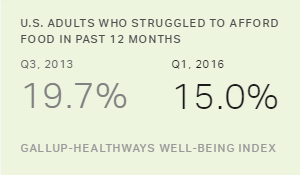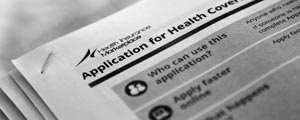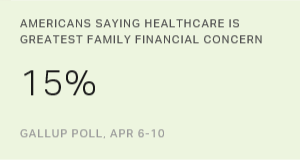Story Highlights
- 15.5% of adults unable to afford necessary healthcare and/or medicine
- Decline coincides with drop in percentage of uninsured Americans
- Fewer insured and uninsured say they have struggled to afford healthcare
WASHINGTON, D.C. -- Fewer Americans reported not having enough money in the past 12 months to pay for necessary healthcare and/or medicines for themselves or their families than at any point since Â鶹´«Ã½AV and Healthways began tracking this metric in 2008. From 2008 through 2013, the percentage of Americans who experienced difficulty in the past 12 months affording healthcare and medicine was fairly steady, hovering near the average of 18.7%. Since then, the average has been 16.4%, including the new quarterly low of 15.5% in the most recent quarter.
![Healthcare-#1[1]](http://content.gallup.com/origin/gallupinc/Â鶹´«Ã½AVSpaces/Production/Cms/POLL/kgwpv9t6tky679fhthkyea.png)
These findings are based on interviews conducted daily from January 2008 through March 2016 as part of the Â鶹´«Ã½AV-Healthways Well-Being Index. Â鶹´«Ã½AV and Healthways classify Americans as healthcare insecure if they report being unable to pay for healthcare and/or medicines they or their family needed at some point in the past 12 months.
Overall, the percentage of U.S. adults with healthcare insecurity has dropped 3.5 percentage points since the fourth quarter of 2013. This drop in healthcare insecurity coincides with the , which has fallen from 17.1% in the fourth quarter of 2013 -- just before the Affordable Care Act's requirement that Americans have health insurance went into effect -- to 11.0% in the first quarter of this year.
The increase in the percentage of Americans having health insurance is likely a key reason why fewer Americans are struggling to pay for healthcare. Generally, those without health insurance are at least three times more likely to report not having enough money for healthcare/medicine than their counterparts with health insurance. In the most recent quarter, 41.8% of the uninsured said they had struggled to pay for healthcare costs, compared with 12.3% of those with insurance.
Still, the drop in the uninsured rate does not account for the entire reduction in the percentage of Americans experiencing healthcare insecurity.
Since late 2013, the percentages of both uninsured and insured Americans who report struggling to afford healthcare has declined. The decline has been larger among the uninsured population (from 45.0% to 41.8%), but the smaller decline among the much larger group of Americans with health insurance (from 13.6% to 12.3%) also contributes to the overall drop in healthcare insecurity.

Both insured and uninsured Americans' greater ability to afford healthcare and medicine could also reflect an improving economy -- most notably unemployment and underemployment rates that have returned to pre-recession levels.
But it could be that Americans are less burdened in other areas, such as energy costs from the decline in gas prices, which leaves more money for healthcare and other expenses. Also, the for themselves or their families is at a record low.
More generally, half of all Americans recently reported that their personal financial situation was either "excellent" or "good," the .
Bottom Line
Although roughly one in six Americans report having times in the past year when they were unable to afford the healthcare or medicine they needed, this is down significantly from just three years ago. The expansion of health insurance coverage to millions more Americans under the Affordable Care Act is likely a major factor in the decline of healthcare insecurity, demonstrating a concrete benefit of the law.
At the same time, there are growing concerns that health insurance costs are set to rise in many parts of the country, as insurers and states adjust to the new healthcare market. These increases would mostly affect Americans who do not qualify for a health insurance subsidy under the Affordable Care Act.
Also, the fate of the law itself remains uncertain. It has survived two Supreme Court challenges to date, but the presumptive Republican presidential nominee Donald Trump has vowed to make repeal of the law a priority if he is elected. If the Affordable Care Act is repealed under a new administration, 24 million Americans could become newly uninsured by 2021, according to a recent Urban Institute report.
Repealing the Affordable Care Act could easily halt or reverse the positive trends in healthcare access, which would certainly affect Americans' ability to pay for healthcare in the future.
Diana Liu contributed to this article
These data are available in .
Survey Methods
Results are based on telephone interviews conducted Jan. 1-March 31, 2016, as part of the Â鶹´«Ã½AV-Healthways Well-Being Index survey, with a random sample of 44,558 adults, aged 18 and older, living in all 50 U.S. states and the District of Columbia. For results based on the total sample of national adults, the margin of sampling error is ±0.6 percentage points at the 95% confidence level.
For data collected prior to Sept. 1, 2015, each sample of national adults includes a minimum quota of 50% cellphone respondents and 50% landline respondents. For data collected between Sept. 1, 2015, and Mar. 31, 2016, each sample of national adults includes a minimum quota of 60% cellphone respondents and 40% landline respondents. Additional minimum quotas by time zone within region are included in the sampling approach.
Learn more about how the works.




